2022年人教版中考英语二轮复习话题一 个人情况、家庭、朋友与周围的人、居住环境课件(114张)
文档属性
| 名称 | 2022年人教版中考英语二轮复习话题一 个人情况、家庭、朋友与周围的人、居住环境课件(114张) | 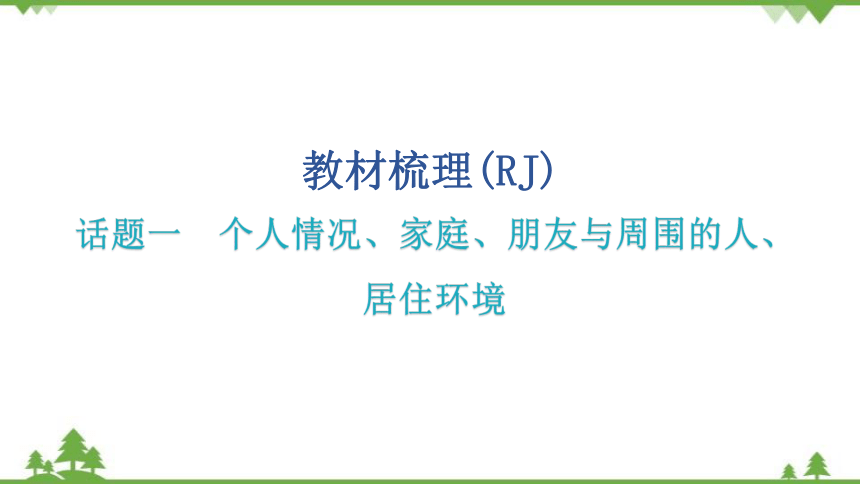 | |
| 格式 | pptx | ||
| 文件大小 | 497.9KB | ||
| 资源类型 | 教案 | ||
| 版本资源 | 人教新目标(Go for it)版 | ||
| 科目 | 英语 | ||
| 更新时间 | 2022-05-24 12:07:06 | ||
图片预览

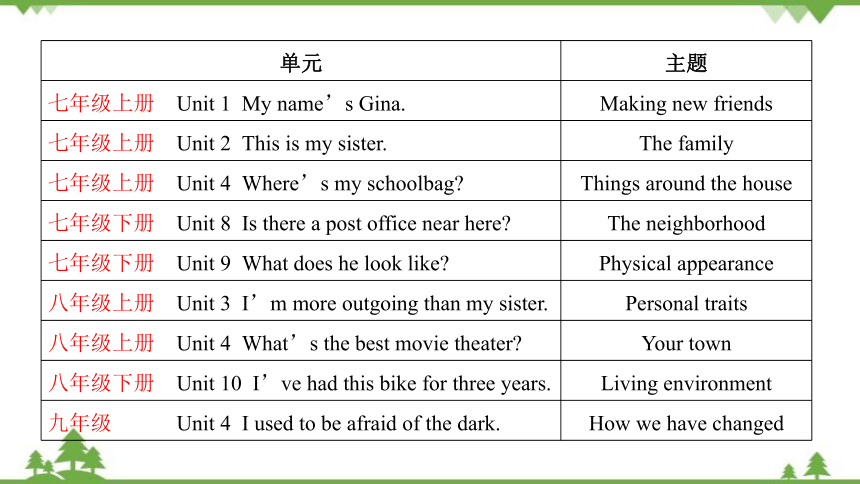
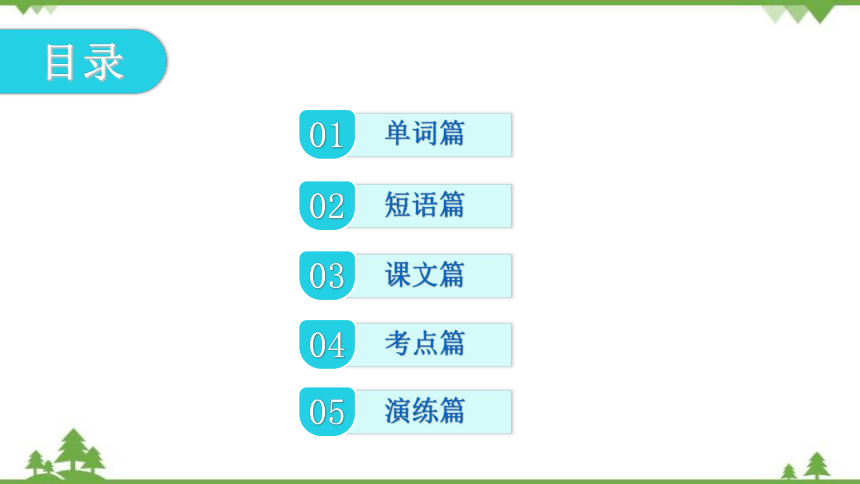
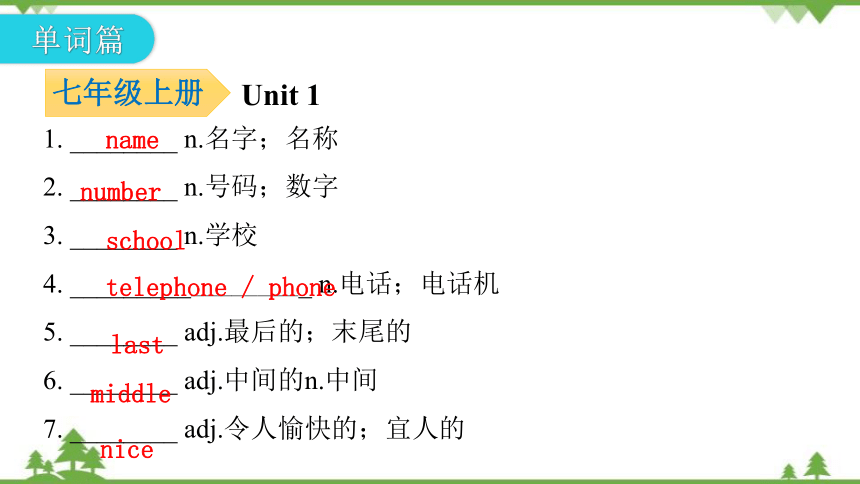
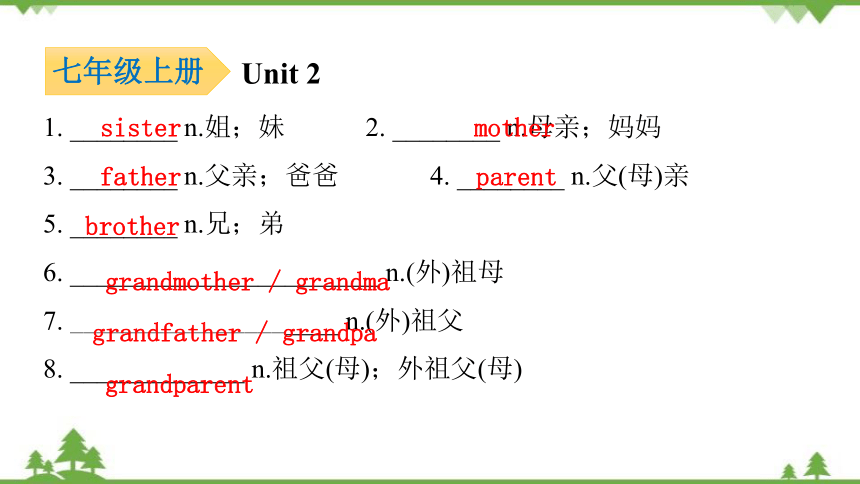
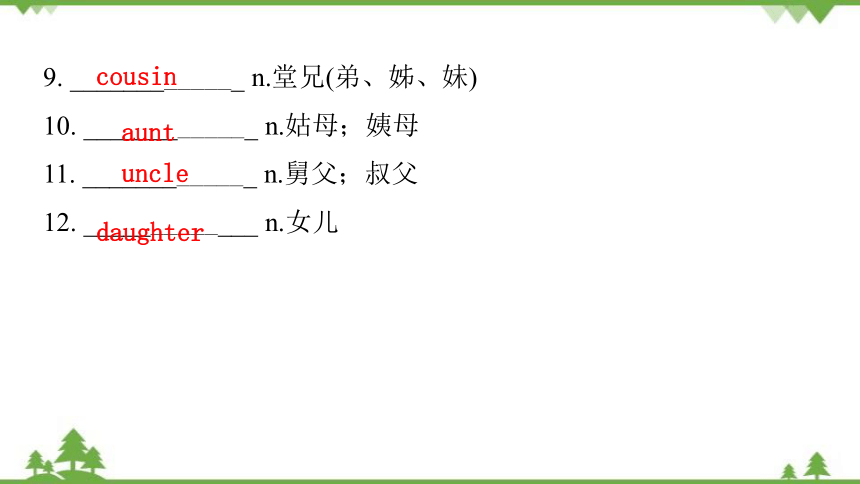
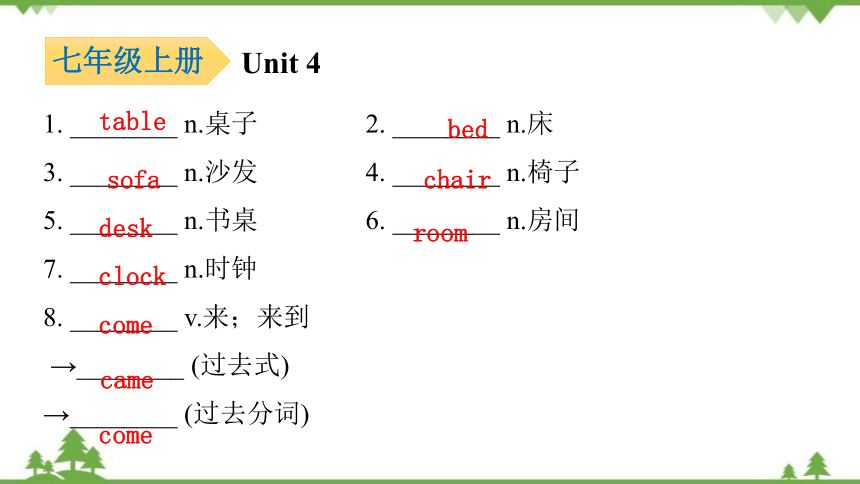
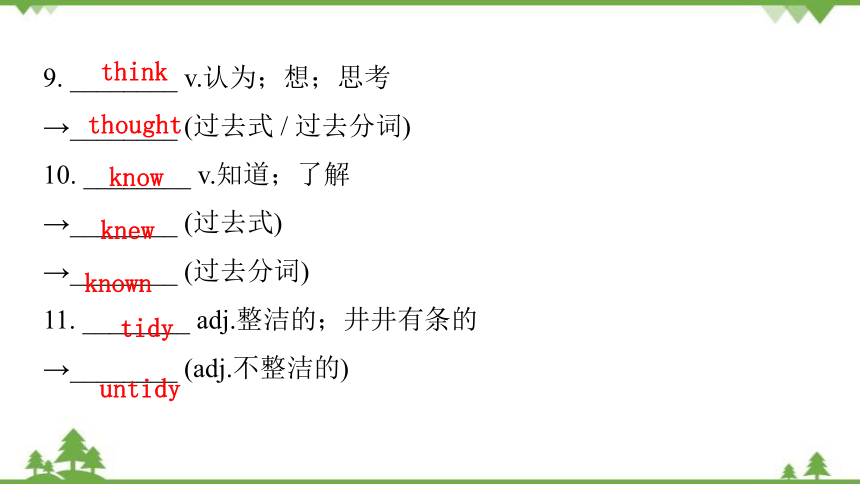
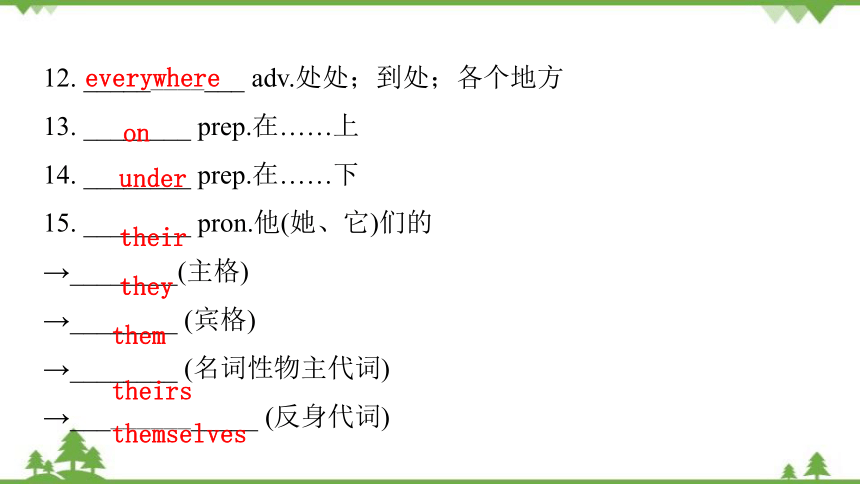
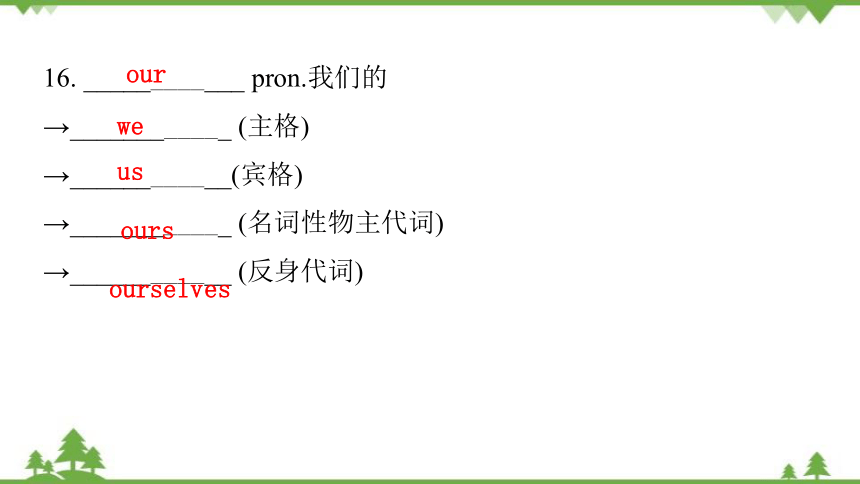


文档简介
(共114张PPT)
教材梳理(RJ)
话题一 个人情况、家庭、朋友与周围的人、
居住环境
单元 主题
七年级上册 Unit 1 My name’s Gina. Making new friends
七年级上册 Unit 2 This is my sister. The family
七年级上册 Unit 4 Where’s my schoolbag Things around the house
七年级下册 Unit 8 Is there a post office near here The neighborhood
七年级下册 Unit 9 What does he look like Physical appearance
八年级上册 Unit 3 I’m more outgoing than my sister. Personal traits
八年级上册 Unit 4 What’s the best movie theater Your town
八年级下册 Unit 10 I’ve had this bike for three years. Living environment
九年级 Unit 4 I used to be afraid of the dark. How we have changed
目录
01
单词篇
02
短语篇
03
课文篇
04
考点篇
05
演练篇
单词篇
七年级上册
Unit 1
1. ________ n.名字;名称
2. ________ n.号码;数字
3. ________ n.学校
4. __________________ n.电话;电话机
5. ________ adj.最后的;末尾的
6. ________ adj.中间的n.中间
7. ________ adj.令人愉快的;宜人的
name
number
school
telephone / phone
last
middle
nice
1. ________ n.姐;妹 2. ________ n.母亲;妈妈
3. ________ n.父亲;爸爸 4. ________ n.父(母)亲
5. ________ n.兄;弟
6. _______________________ n.(外)祖母
7. ____________________ n.(外)祖父
8. _____________ n.祖父(母);外祖父(母)
七年级上册
Unit 2
sister
mother
father
parent
brother
grandmother / grandma
grandfather / grandpa
grandparent
9. _____________ n.堂兄(弟、姊、妹)
10. _____________ n.姑母;姨母
11. _____________ n.舅父;叔父
12. _____________ n.女儿
cousin
aunt
uncle
daughter
1. ________ n.桌子 2. ________ n.床
3. ________ n.沙发 4. ________ n.椅子
5. ________ n.书桌 6. ________ n.房间
7. ________ n.时钟
8. ________ v.来;来到
→________ (过去式)
→________ (过去分词)
七年级上册
Unit 4
table
bed
sofa
chair
desk
room
clock
come
came
come
9. ________ v.认为;想;思考
→________ (过去式 / 过去分词)
10. ________ v.知道;了解
→________ (过去式)
→________ (过去分词)
11. ________ adj.整洁的;井井有条的
→________ (adj.不整洁的)
think
thought
know
knew
known
tidy
untidy
12. ____________ adv.处处;到处;各个地方
13. ________ prep.在……上
14. ________ prep.在……下
15. ________ pron.他(她、它)们的
→________(主格)
→________ (宾格)
→________ (名词性物主代词)
→______________ (反身代词)
everywhere
on
under
their
they
them
theirs
themselves
16. ____________ pron.我们的
→____________ (主格)
→____________(宾格)
→____________ (名词性物主代词)
→____________ (反身代词)
our
we
us
ours
ourselves
1. ________ n.邮政 2. ________ n.办公室
3. ________ n.警察 4. ________ n.旅馆;酒店
5. ________ n.餐馆 6. ________ n.银行
7. ________ n.医院 8. ________ n.大街
9. ________ n.镇;市镇 10. ________ n.路
11. ________ n.空气
七年级下册
Unit 8
post
office
police
hotel
restaurant
bank
hospital
street
town
road
air
12. ________ v.& n. 付费→________ (过去式 / 过去分词)
13. ________ v.花(时间、钱等) →________ (过去式 / 过去分词)
14. ________ v.享受;喜爱→____________ (adj.使人愉快的)
→____________ (n.快乐)
15. ________ adv.容易地 →________ (adj.容易的)
pay
paid
spend
spent
enjoy
enjoyable
enjoyment
easily
easy
1. ________ n. 身高;高度→________ adj.& adv. 高的(地)
2. ________ n. 电影院
3. ________ n. 人→________ (adj. 个人的)
4. ________ n. 鼻子 5. ________ n. 嘴
6. ________ n. 脸 7. ________ n. 眼睛
8. ________ v. 放→________ (过去式 / 过去分词)
七年级下册
Unit 9
height
high
cinema
person
personal
nose
mouth
face
eye
put
put
9. ________ v. 描述→____________ (n. 描述)
10. ________ adj. 直的 11. ________ adj. 高的
12. ________ adj. 瘦的 13. ________ adj. 小的
14. ________ adj. 英俊的 15. ________ adj. 圆形的
16. ________ adj. 真正的;真实的→________ (adv. 真正地)
17. _____________ adv. 不同地→_____________ (adj. 不同的)
→_____________ (n. 差异)
describe
description
straight
tall
thin
little
handsome
round
real
really
differently
different
difference
1. ________________ n.比赛;竞赛;竞争
2. ________ n.小孩;年轻人
3. ________ n.成绩等级;评分等级
4. ________ v.伸手;到达;抵达
5. ________ v.分享;共享;共用;分摊
八年级上册
Unit 3
competition
kid
grade
reach
share
6. ____________ v.(使)破;裂;碎;损坏
→____________ (过去式)
→____________ (过去分词)
7. ____________ v.在意;担忧;关心
→____________ (adj.小心的)
→____________ (adv.小心地)
break
broke
broken
care
careful
carefully
8. ________ v.获胜;赢;赢得
→________(过去式 / 过去分词)
→________ (n.获胜者)
9. ______________ adj.必需的;必要的
→______________ (adv.必然地)
→______________ (adj.不必要的)
win
won
winner
necessary
necessarily
unnecessary
10. ____________ adj.响亮的;大声的
→____________ (adv.响亮地)
11. ____________ adj.相像的;类似的
→____________ (adv.相像地)
→____________ (n.相似性)
loud
loudly
similar
similarly
similarity
1. ________ n.戏院;剧场
2. ________ n.接待;服务
→________ (v.服务)
3. ________ n.早(或午、晚)餐
4. ________________ n.表演者;演员
→________________ (v.表演)
→________________ (n.表演)
八年级上册
Unit 4
theater
service
serve
meal
performer
perform
performance
5. ________ n.天资;天赋
→________ (adj.有才能的)
6.choose v.选择;挑选
→________(过去式)
→________ (过去分词)
→________ (n.选择)
talent
talented
chose
chosen
choice
7.act v.扮演n.表演者
→________ (n.男演员)
→________ (n.女演员)
→________ (n.行动)
8. ________ v.提供;给
→________(过去式)
→________ (过去分词)
actor
actress
action
give
gave
given
9. ____________ adj.使人舒服的;舒适的
→____________ (adv.舒服地)
→____________ (adj.不舒服的)
10. __________ adj.(在空间、时间上)接近
→__________ (adv.密切地)
11. __________ adj.新鲜的;清新的
comfortable
comfortably
uncomfortable
close
closely
fresh
12. ________ adj.有创造力的; 创造性的
→________ (v.创造)
→________ (n.创造力)
13. ________ adj.贫穷的;清贫的
14. ________ adv.便宜地;低廉地
→________ (adj.便宜的)
15. ________ adv.相当adj.漂亮的
creative
create
creativity
poor
cheaply
cheap
pretty
16. ____________ adv.美好地;漂亮地
→____________ (adj.美丽的)
→____________ (n.美)
17. ____________ adv.严重地;严肃地
→____________ (adj.严肃的)
beautifully
beautiful
beauty
seriously
serious
1. _____________ n.院子
2. _____________ n.记忆;回忆
→_____________ (v.记住)
3. _____________ n.卧室
4. _____________ n.家乡;故乡
5. _____________ n.羞耻;羞愧;惭愧
八年级下册
Unit 10
yard
memory
memorize
bedroom
hometown
shame
6. __________ n.百年;世纪
→__________ (复数形式)
7. __________ v.拥有;有
→__________ (n.物主)
8. __________ v.将……认为;把……视为
9. __________ v.注视;仔细考虑
10. __________ v.拥有;抓住
→__________ (过去式 / 过去分词)
century
centuries
own
owner
regard
consider
hold
held
11. ___________ adj.地位(或职位、级别)低下的
12. ___________ adj.诚实的;老实的
→___________ (n.诚实)
→___________ (adj.不老实的)
13. ___________ adj.诚实的;真实的
→___________ (n.实情)
→___________ (adj.真的)
→___________ (adv.真正)
junior
honest
honesty
dishonest
truthful
truth
true
truly
1. ____________ n.介绍
→____________ (v.介绍)
2. ____________ v.采访;面试n.面试;访谈
→____________ (n.采访者)
3. ____________ v.对付;对待
→____________(过去式 / 过去分词)
九年级
Unit 4
introduction
introduce
interviewer
deal
dealt
interview
4. __________ v.敢于;胆敢
5. ____________ v.需要;要求
→____________ (n.要求)
6. ____________ v.& n.影响
7. ____________ v.不及格;失败;未能(做到)
→____________ (n.失败)
8. ___________ adj.有幽默感的;滑稽有趣的
→___________ (n.幽默)
dare
require
requirement
influence
fail
failure
humorous
humor
9. ___________ adj.不说话的;沉默的
→___________ (n.沉默)
→___________ (adv.静静地)
10. ___________ adj.有用的;有帮助的
→___________ (v.& n.帮助)
→___________ (adj.无助的)
silent
silence
silently
helpful
help
helpless
11. __________ adj.亚洲(人)的n.亚洲人
→___________ (n.亚洲)
12. _____________ adj.欧洲(人)的n.欧洲人
→___________ (n.欧洲)
13. ___________ adj.非洲(人)的n.非洲人
→___________ (n.非洲)
14. ___________ adj.英国(人)的
→___________ (n.大不列颠)
Asia
Europe
African
Africa
British
Britain
Asian
European
15. ____________ adj.缺席;不在
→____________ (n.缺席)
16. ____________ adj.自豪的;骄傲的
17. ____________ adj.总的n.将军
→____________ (adv.普遍地)
18. ____________ adv.确切地; 精确地
→____________ (adj.准确的)
absent
absence
proud
general
generally
exactly
exact
短语篇
七年级上册
Unit 1
1.名字 _____________ 2.姓 _____________
first name
last name
七年级上册
Unit 2
1.在我的家庭里 __________________
2.我的一张全家福 ____________________
in my family
a photo of my family
七年级上册
Unit 4
1.在某人的床上 / 下 ______________________________
2.在沙发上 / 下 ____________________
3.在某人的房间里 ____________________
4.在书柜里 ____________________
5.快点儿 _________________
on / under one’s bed
on / under the sofa
in one’s room
in the bookcase
come on
七年级下册
Unit 8
1.邮局 ________________
2.警察局 _________________
3.离……远 ________________
4.沿着……走 ________________
5.向左 / 右转 __________________
post office
police station
far from …
go along
turn left / right
6.在第一个十字路口处 ________________________
7.看起来像 ____________
8.看见某人 / 某物正在做某事 ____________________________
at the first crossing
look like
watch sb. / sth. doing sth.
七年级下册
Unit 9
1.短卷发 ______________________
2.长直发 ________________________
3.中等身高 __________________________
4.戴着眼镜 ____________________
5.一个大鼻子 ____________________
short curly hair
long straight hair
(be) of medium height
wear glasses
a big nose
6.一张小嘴巴 __________________________
7.一张圆 / 长脸 __________________________
8.把……描述得不一样 ______________________
a small mouth
a round / long face
describe … differently
八年级上册
Unit 3
1.更外向的 ____________________
2.与……相像的 ____________________
3.和……相同;与……一致 ____________________
4.与……不同 ________________________
5.关心;在意 ____________________
6.像一面镜子 ______________________
more outgoing
be similar to
the same as
be different from
care about
be like a mirror
7.只要;既然 __________________
8.使显现;使表现出 __________________
9.取得更好的成绩 __________________
10.事实上;实际上 __________________
11.令某人感动 __________________
12.有音乐天赋 ________________________
as long as
bring out
get better grades
in fact
touch one’s heart
be talented in music
13.擅长于…… __________________
14.善于与……相处 __________________
15.让某人做某事 __________________
16.想要做某事 __________________
be good at …
be good with
make sb. do sth.
want to do sth.
八年级上册
Unit 4
1.电影院 ________________________
2.服装店 ________________
3.到目前为止 ________________
4.有相同特征 ________________________
5.世界各地 ____________________
6.越来越…… ____________________
movie theater
clothes store
so far
have … in common
around the world
more and more …
7.各种各样的 ________________
8.编造(故事、谎言等) ________________
9.在……方面发挥作用 ________________
10.例如 ________________
11.认真对待…… ________________
12.实现 ________________
all kinds of
make up
play a role in …
for example
take … seriously
come true
八年级下册
Unit 10
1.不再…… ________________________
2.察看;观察 ________________________
3.棋类游戏 ________________________
4.初级中学 ________________________
5.清理 ________________________
6.不再;不复 ________________________
not … anymore
check out
board games
junior high school
clear out
no longer
7.说实在的 ________________________
8.处理 ________________________
9.找工作 ________________________
10.依据;按照 ________________________
11.依……看 ________________________
to be honest
do with
search for work
according to
in one’s opinion
九年级
Unit 4
1.过去常常做某事 ________________________
2.公开地 ________________________
3.时常;有时 ________________________
4.亲自 ________________________
5.处理 ________________________
6.照顾;照料 ________________________
used to do sth.
in public
from time to time
in person
deal with
take care of
7.为……骄傲 ________________________
8.为……感到自豪 ________________________
9.害怕 ________________________
10.敢于做某事 ________________________
11.许多 ________________________
12.对某事紧张 ________________________
be proud of
take pride in
be afraid of
dare to do sth.
tons of
be nervous about sth.
七年级上册
Unit 1
1.我的朋友在中国。
_________________________________________________
2.我叫戴尔·米勒而我的朋友叫埃里克·布朗。
________________________________________________
课文篇
My friend is in China.
I’m Dale Miller and my friend is Eric Brown.
七年级上册
Unit 2
1.这是我妹妹。
________________________________________________
2.蔻蔻也是我家中的一位成员。
________________________________________________
3.他们是我的祖父母。
________________________________________________
This is my sister.
Coco is in my family, too.
They’re my grandparents.
七年级上册
Unit 4
1.我(爱)整洁,但吉娜却不(整洁)。
_________________________________
2.吉娜的书到处都是。
_________________________________
I’m tidy, but Gina is not.
Gina’s books are everywhere.
3.——他的铅笔盒在哪里
_____________________________________________
——它在他的书包里。
_____________________________________________
—Where’s his pencil box
—It’s in his schoolbag.
七年级下册
Unit 8
1.我喜欢在那儿度过周末。
________________________________________________
2.它(图书馆)很安静,我喜欢在那里看书。
________________________________________________
I like to spend time there on weekends.
It is very quiet and I enjoy reading there.
七年级下册
Unit 9
1.他留着棕色头发,戴着眼镜。
_____________________________________________
2.他既不高也不矮。他中等身高。
_____________________________________________
He has brown hair and wears glasses.
He isn’t tall or short.He is of medium height.
3.——你的朋友长什么样
__________________________________________________
——她中等身高,留着长直发。
__________________________________________________
—What does your friend look like
—She’s of medium height,and she has long straight hair.
八年级上册
Unit 3
1.我最好的朋友(能够)帮我激发出自己的所能。
____________________________________________________
2.一个真正的朋友是在需要时给你帮助,使你感动。
____________________________________________________
3.朋友如书——不在多而贵在好。
But I think _________________________—you don’t need a lot of them ____________________________.
My best friend helps to bring out the best in me.
A true friend reaches for your hand and touches your heart.
friends are like books
as long as they’re good
八年级上册
Unit 4
1.最好的电影院是哪家
_______________________________________________
2.那由你自己来决定。
_______________________________________________
3.你认为970AM电台怎么样
_________________________________ 970 AM
What’s the best movie theater
That’s up to you to decide.
What do you think of
八年级下册
Unit 10
1.——那边的那辆自行车你买了多久了
_____________________________________________
——我买了它三年了!
_____________________________________________
2.现今,数以百万计的中国人离开农村到城市去寻找工作。
Nowadays, _____________________ leave the countryside to _______________________ in the cities.
—How long have you had that bike over there
—I’ve had it for three years!
millions of Chinese
search for work
九年级
Unit 4
1.葆拉过去真的很安静。 ______________________________
2.李文的不快乐开始影响他的功课。
Li Wen’s unhappiness ______________________ his schoolwork.
3.很难相信他过去在学校有许多困难。
________________________ he used to have difficulties in school.
Paula used to be really quiet.
began to influence
It is hard to believe that
考点1
形容词性物主代词的用法【七年级上册 Unit 1】
专练 根据句意及中文提示,用单词的适当形式填空
1.________ (我们的) parents are both office workers.
2.Could you please help ________(我们) find the lost boy.
3.________ (他) has a new toy car.
4.This is my dictionary. Where is ________ (你的) dictionary
=This is my dictionary. Where is ________(你的)
考点篇
Our
us
He
your
yours
点拨 1.形容词性物主代词:作定语,修饰名词。2.名词性物主代词:常用来避免与前面已提及的名词重复,相当于“形容词性物主代词+名词”。(详解见主书第一部分 [第五节 代词])
考点2
指示代词this, that, these, those的用法【七年级上册 Unit 2】
专练
( )1._____ is a book. And _____ are pens.
A.This;this B.These;these C.This;these D.These;this
( )2.—Are those your sisters —Yes, _____.
A.those aren’t B.they are C.those are D.they aren’t
( )3.Look over there! _____ is my father.He is reading.
A.This B.That C.He D.They
C
B
B
点拨 单数:this (这个),that (那个);复数:these (这些),those (那些)。(详解见主书第一部分 [第五节 代词])
考点3
where引导的特殊疑问句【七年级上册 Unit 4】
专练 根据汉语意思完成句子,词数不限
1.——你的学生卡在哪里 ——它在我的书包里。
—________ your ID card —________ my schoolbag.
2.——你爸爸的钥匙在哪里 ——它们在沙发上。
—___________ your father’s keys —___________ the sofa.
3.——她的戒指在哪里 ——它在床底下。
—________ her ring —____________ the bed.
Where’s
It’s in
Where are
They’re on
Where’s
It’s under
点拨 1.where用于询问人或物品的位置,常用句式结构为“Where + be (am / is / are)+主语 ”,其中be动词 (am / is / are)的选择取决于后面的主语。2.其答句结构为“主语 + be (am / is / are)+介词 + 冠词 / 形容词性物主代词 / 名词所有格+名词.”。
考点4
There be句型【七年级下册 Unit 8】
专练 根据汉语意思完成句子,词数不限
1.——这附近有银行吗 ——是的,有。/ 不,没有。
—________ there a bank near here —Yes, ________. / No, ______________.
2.——这附近有酒店吗 ——是的,有。/ 不,没有。
—________ there any hotels near here —Yes, __________. / No, ____________.
Is
there is
there isn’t
Are
there are
there aren’t
3.小镇里有一部付费电话和两家医院。
There ________ a pay phone and two hospitals in the town.
4.小镇里有两家医院和一部付费电话。
There ________ two hospitals and a pay phone in the town.
点拨 1.There be 结构表示“某地或某时有某物或某人”。2. There be 结构遵循“就近一致”原则。(详解见主书第一部分 [第十节 句子种类])
is
are
考点5
选择疑问句【七年级下册 Unit 9】
专练
( )1.—Is your daughter at home or at school —_____.
A.Yes, she is B.No, she isn’t
C.Yes, she is at home D.She is at home
D
2.——她喜欢红色还是黄色 ——她喜欢红色。(根据汉语意思完成句子,词数不限)
—________ she ________ red ______ yellow —She ________.
点拨 选择疑问句的回答不同于一般疑问句,不能用yes / no来回答,而必须选择选项进行回答。(详解见主书第一部分 [第十节 句子种类])
Does
like
or
likes red
考点6
“What does / do … look like ”的用法 【七年级下册 Unit 9】
专练
( )1.—What does Lucy look like —_____.
A.She is tall
B.She likes drawing
C.She would like some beef
D.She is kind
A
( )2.—_____ —She likes playing the piano.
A.What does his sister look like
B.What is his sister like
C.What does his sister like
D.What is his sister
C
( )3.—You saw Vince’s father yesterday._____ —He is tall and he wears glasses.
A.What is he like B.What does he like
C.Why does he like it D.How does he like it
点拨 1.What does he look like (侧重于询问外貌)他长什么样?2.What is he like (侧重于询问品质、性格) 他怎么样 3.What does he like (询问个人爱好)他喜欢什么
A
考点7
in the end和at the end of的区别【七年级下册Unit 9】
专练 根据汉语意思完成句子,词数不限
1.最后,他完成了工作。 ____________, he finished the work.
2.路的尽头有一家邮局。There is a post office ______________ the road.
3.这个月底他们将建好这座桥。They will finish building the bridge ________________ this month.
In the end
at the end of
at the end of
点拨 1.in the end 意为“最后”,相当于at last / finally。2.at the end of指地点时,意为“在……的末尾”;指时间时,意为“在……末 / 底”。
考点8
形容词、副词的原级和比较级【八年级上册Unit 3】
专练 根据句意,选择合适的单词或短语完成句子
1.Friends are ________________ (important / more important) than money.
2.It’s ______________ (as cold as / not colder) yesterday.Put on your coat.
3.Let’s go by bus. It’s much ____________ (cheap / cheaper).
more important
as cold as
cheaper
4.The ____________ (long / longer) he stays in China, the more he likes China.
点拨 比较级的用法: 1.“形容词 / 副词比较级+than”意为“比……更……”。2.“比较级+and+比较级”意为“越来越……”。3.“the + 比较级……,the + 比较级……”意为“越……,就越……”。4.当需要表示一方超过另一方的程度时,可以用much, a lot, a little, a bit, even, still等来修饰形容词比较级。
longer
【注意】 比较级不能用very, so, too, quite等修饰。(详解见主书第一部分 [第六节 形容词和副词])
考点9
both和all的区别【八年级上册 Unit 3】
专练 根据汉语意思完成句子,词数不限
1.我们两个都是学生。____________________ are students.
2.我们俩都喜欢英语。________________________________ English.
3.昨天,三班的学生全都去了公园。 The students in Class 3 ______________ the park yesterday.
Both of us
Both of us like / We both like
all went to
4.我们所有人都在为考试而学习。 _______________________________ studying for the test.
点拨 both 指“两者都……”,all 指“三者或三者以上都……”。它们一般用在be动词、助动词及情态动词之后,行为动词之前。
All of us are / We are all
考点10
形容词、副词的最高级【八年级上册Unit 4】
专练
( )1.Tony always works hard.Of all the students, he did _____ in this exam.
A.good B.well C.better D.best
( )2.The Yellow River is the second _____ river in China.
A.the longest B.longest C.longer D.long
D
B
( )3.Mary has a talent for singing. She sings _____ in our class.
A.most beautifully B.more beautifully
C.most beautiful D.more beautiful
( )4.—Who goes to school _____, Linda, Jack or Tom
—Jack is _____ than Linda, but Tom is the earliest.
A.earlier; the earliest B.earliest; the earliest
C.earliest; earlier D.earlier; earlier
A
C
点拨 1.英语中三者或三者以上相比较,表示“最……” 这样的最高程度概念时,要用 “the+最高级” 表示。2.形容词和副词的最高级后常跟比较范围,比较范围常用含有of或in的介词短语表示。3.表示 “最……之一”,要用“one of the+形容词最高级+复数名词.”。4.最高级前可加序数词。(详解见主书第一部分 [第六节 形容词和副词])
考点11
“What do you think of … ”的用法 【八年级上册Unit 4】
专练
( )1.—What do you think of soap operas —_____. I hate them very much.
A.I love them B.I like them
C.I can’t stand them D.I don’t mind them
( )2.How does he _____ the three-child policy
A.think of B.like C.thinks of D.likes
C
B
点拨 “What do you think of … = How do you like … ” 意为“你觉得……怎么样 ”
考点12
现在完成时【八年级下册 Unit 10】
专练 根据要求完成句子,每空一词
1.The show began half an hour ago.(改为同义句)
The show ________ ________ ________ for half an hour.
2.Mary joined the music club last year.(改为同义句)
Mary ________ ________ ________ the music club ________ one year.
has
been
on
has
been
in
for
3.My uncle moved to Paris ten years ago.(改为同义句)
________ ________ ________ ten years ________ my uncle moved to Paris.
点拨 现在完成时表示过去的动作或状态持续到现在,对现在造成的影响,可能持续发生下去。由“助动词have / has+过去分词”构成。(详解见主书第一部分 [第八节 动词时态])
It
has
been
since
考点13
among和between 的区别 【八年级下册 Unit 10】
专练 根据汉语意思完成句子,每空一词
1.他在树林中建了一栋房子。He built a house ________ the trees.
2.我坐在乔和戴安娜的中间。I sat down ________ Joe ________ Diana.
点拨 among表示“三者或三者以上之间”;between表示“两者之间”。
among
between
and
考点14
used to结构的用法【九年级 Unit 4】
专练 根据汉语意思完成句子,词数不限
1.我过去常常和爷爷下国际象棋。I ____________________ with Grandpa.
2.他们曾经不吃肉。They ____________________ meat.
3.她过去常常戴眼镜吗 ________________________ glasses
used to play chess
didn’t use to eat
Did she use to wear
点拨 used to后接动词原形,意为“过去常常做某事”,表示过去与现在的对比,暗含现在已经不存在的动作或状态。句型为:1.肯定句:主语+used to+v.+其他.2.否定句:主语+didn’t use to+v.+其他.3.一般疑问句:Did+主语+use to+v.+其他
考点15
proud和pride的区别【九年级 Unit 4】
专练
( )1.My parents take _____ in what I’m doing.
A.proud B.proud of C.pride D.prides
( )2.—Mom, I was the only one to get the full mark in this test.
—Good job, Bob! I’m so _____ of you.
A.careful B.pride C.proud D.tired
C
C
点拨 proud作形容词,意为“自豪的;骄傲的”。pride作名词,意为 “自豪;骄傲”。be proud of = take pride in,意为“为……骄傲;感到自豪”。
考点16
too much, too many和much too的区别【九年级Unit 4】
专练
( )1.—What’s the matter —I have a stomachache.Maybe I have drunk _____ icy water.
A.too much B.too many
C.much too D.many too
A
( )2.—The meat is _____ delicious.
—Yes, but don’t eat _____.
A.too much; too many
B.much too; too much
C.too many; much too
D.much too; much too
B
点拨 too much和too many均意为“太多”;too much后接不可数名词,too many后接可数名词的复数形式。much too意为“太;非常”, 相当于too, 但语气更强, 后接形容词。
演练篇
一、语法选择
Alexander was a funny student. He loved watching comedies best and hoped to become _1 _ comedy actor in the future. _2 _ he heard there was going to be a talent show at his school, he decided to take part in it. Though he had never acted in public before, he was very excited about his _3 _ performance. But some students laughed at him.
a
When
first
Alexander couldn’t understand why they laughed at him. For a moment, he thought about _4 _ up the show. But he remembered how much his friends liked his jokes, and also his teachers said he was very funny. _5 _ he decided to prepare for the show.
Alexander did a great job. Everyone loved his performance, and he won the first prize! His teachers and friends were proud
giving
So
_6 _ him. Only Ken told Alexander that he was not funny and he would never be _7 _. Alexander did not understand why Ken _8 _ so, but he continued to work towards his goal.
As the years went on, Alexander met more people like Ken.“You will do a terrible job,” they said to him. Luckily, most people encouraged him and some helped him become even funnier. His fans thanked him because his comedies made _9 _ feel good when they were unhappy.
of
successful
said
them
Now Alexander is a comedy star! He says he is very thankful to the people _10 _ have laughed at him. Without them, he cannot be successful.
who
( )1.A.the B.an C.a D./
( )2.A.When B.Why C.Which D.What
( )3.A.one B.first C.the one D.the first
( )4.A.give B.gives C.to give D.giving
( )5.A.So B.But C.Because D.Although
C
A
B
D
A
( )6.A.with B.of C.in D.to
( )7.A.success B.successfully
C.succeed D.successful
( )8.A.say B.says C.was saying D.said
( )9.A.they B.their C.them D.theirs
( )10.A.whoever B.whom C.whose D.who
B
D
D
C
D
二、阅读理解(B篇)
For many Chinese families, rice is an important part of almost every meal. Where does rice come from Yuan Longping and his team have worked to grow rice on the farmland(耕地).
China has 22% of the world’s population, but only 7% of its farmland, so food was a big problem in China in the past. In the 1960s, there was a terrible famine(饥荒) in China. Millions of
people died because they had no food. Yuan taught farming at school at that time and he was really sad to see this. “How can I help them have enough food ” he thought. He decided to work on a kind of hybrid rice(杂交水稻) because it has higher output.
At the time, other scientists hardly believed hybrid rice had much value. But Yuan and his team worked on it every day. They took very good care of their rice.
At last, in 1973, they grew a new type of hybrid rice. Farmers can grow it in many different kinds of farmland and also in bad weather. It can fight disease, too. Its output is much greater than common kinds of rice. With the new type, about 70,000,000 people could have food every year!
Yuan solved the food problem in China. Before he retired(退休), he hoped to grow rice by the sea!
( )1.Food was a big problem in China in the past because _____.
A.farmers didn’t know how to grow hybrid rice
B.there are too many people in China but farmland isn’t enough
C.people were so poor that they couldn’t buy food
D.people don’t have farmland
B
( )2.The underlined word “output” means _____.
A.something is liked by a lot of people
B.the standard of something
C.the total of things that are made or grown
D.something that helps you to be more successful than others
C
( )3.Which of the following is NOT true according to the passage
A.Most Chinese people have rice as their daily main food.
B.Yuan and his team have spent much time developing rice.
C.Yuan worked as a farmer during the famine in 1960s.
D.In 1973, a new type of hybrid rice can be grown in bad weather and can fight disease.
C
( )4.What can we learn from the passage
A.Other scientists all joined Yuan’s team to help him grow hybrid rice.
B.It is easy for the farmers to grow hybrid rice.
C.Yuan was happy to see hybrid rice come out, so he retired to rest.
D.Before Yuan retired, he hoped to grow rice in the sea.
B
( )5.The writer writes this passage to _____.
A.help us know about Yuan and his hybrid rice
B.discuss how to solve the food problem with us
C.tell us the importance of saving food
D.ask us to learn how to grow hybrid rice
A
三、回答问题
My husband received a letter a month ago from a young woman, Mary, who had been his student when she was in middle school. She wanted to thank him for making a great difference to her life.
In the letter she wrote,“You were the teacher who helped me discover my talent for math. Before you came to teach us, I had
been terribly poor at math, and had never thought that I would be interested in it. To my surprise, you magically showed me the beauty of math. I guess that was the turning point of my attitude towards it. You were so kind and patient to answer every question I asked. With your help, I found my interest in it began to grow. Because of your encouragement. I made continuous progress in math, and finally decided to study it in the university. Today I am
working in a research center in California. You played an important part. Thank you!”
What a wonderful gift to a retired teacher! My husband has received many letters from students over the years. This one was special, for it arrived at this time in his life when he is in very poor health.
1.When did the writer’s husband receive the letter
__________________________________________________________________________________________________________
2.What was the job of the writer’s husband
_____________________________________________________
_____________________________________________________
The writer’s husband / He received the letter / it a month ago. / A month ago.
The writer’s husband / He was a math teacher. / A math teacher.
3.Why did Mary write this letter
_____________________________________________________
_____________________________________________________
4.How did Mary think of her math teacher
_____________________________________________________
_____________________________________________________
Mary / She wrote this letter / it to thank the writer’s husband. / To thank the writer’s husband.
Mary / She thought her math teacher / he was kind and patient. / Kind and patient.
5.Where is Mary working
_____________________________________________________
_____________________________________________________
Mary / She is working in a research center in California. / In a research center in California.
谢 谢!
教材梳理(RJ)
话题一 个人情况、家庭、朋友与周围的人、
居住环境
单元 主题
七年级上册 Unit 1 My name’s Gina. Making new friends
七年级上册 Unit 2 This is my sister. The family
七年级上册 Unit 4 Where’s my schoolbag Things around the house
七年级下册 Unit 8 Is there a post office near here The neighborhood
七年级下册 Unit 9 What does he look like Physical appearance
八年级上册 Unit 3 I’m more outgoing than my sister. Personal traits
八年级上册 Unit 4 What’s the best movie theater Your town
八年级下册 Unit 10 I’ve had this bike for three years. Living environment
九年级 Unit 4 I used to be afraid of the dark. How we have changed
目录
01
单词篇
02
短语篇
03
课文篇
04
考点篇
05
演练篇
单词篇
七年级上册
Unit 1
1. ________ n.名字;名称
2. ________ n.号码;数字
3. ________ n.学校
4. __________________ n.电话;电话机
5. ________ adj.最后的;末尾的
6. ________ adj.中间的n.中间
7. ________ adj.令人愉快的;宜人的
name
number
school
telephone / phone
last
middle
nice
1. ________ n.姐;妹 2. ________ n.母亲;妈妈
3. ________ n.父亲;爸爸 4. ________ n.父(母)亲
5. ________ n.兄;弟
6. _______________________ n.(外)祖母
7. ____________________ n.(外)祖父
8. _____________ n.祖父(母);外祖父(母)
七年级上册
Unit 2
sister
mother
father
parent
brother
grandmother / grandma
grandfather / grandpa
grandparent
9. _____________ n.堂兄(弟、姊、妹)
10. _____________ n.姑母;姨母
11. _____________ n.舅父;叔父
12. _____________ n.女儿
cousin
aunt
uncle
daughter
1. ________ n.桌子 2. ________ n.床
3. ________ n.沙发 4. ________ n.椅子
5. ________ n.书桌 6. ________ n.房间
7. ________ n.时钟
8. ________ v.来;来到
→________ (过去式)
→________ (过去分词)
七年级上册
Unit 4
table
bed
sofa
chair
desk
room
clock
come
came
come
9. ________ v.认为;想;思考
→________ (过去式 / 过去分词)
10. ________ v.知道;了解
→________ (过去式)
→________ (过去分词)
11. ________ adj.整洁的;井井有条的
→________ (adj.不整洁的)
think
thought
know
knew
known
tidy
untidy
12. ____________ adv.处处;到处;各个地方
13. ________ prep.在……上
14. ________ prep.在……下
15. ________ pron.他(她、它)们的
→________(主格)
→________ (宾格)
→________ (名词性物主代词)
→______________ (反身代词)
everywhere
on
under
their
they
them
theirs
themselves
16. ____________ pron.我们的
→____________ (主格)
→____________(宾格)
→____________ (名词性物主代词)
→____________ (反身代词)
our
we
us
ours
ourselves
1. ________ n.邮政 2. ________ n.办公室
3. ________ n.警察 4. ________ n.旅馆;酒店
5. ________ n.餐馆 6. ________ n.银行
7. ________ n.医院 8. ________ n.大街
9. ________ n.镇;市镇 10. ________ n.路
11. ________ n.空气
七年级下册
Unit 8
post
office
police
hotel
restaurant
bank
hospital
street
town
road
air
12. ________ v.& n. 付费→________ (过去式 / 过去分词)
13. ________ v.花(时间、钱等) →________ (过去式 / 过去分词)
14. ________ v.享受;喜爱→____________ (adj.使人愉快的)
→____________ (n.快乐)
15. ________ adv.容易地 →________ (adj.容易的)
pay
paid
spend
spent
enjoy
enjoyable
enjoyment
easily
easy
1. ________ n. 身高;高度→________ adj.& adv. 高的(地)
2. ________ n. 电影院
3. ________ n. 人→________ (adj. 个人的)
4. ________ n. 鼻子 5. ________ n. 嘴
6. ________ n. 脸 7. ________ n. 眼睛
8. ________ v. 放→________ (过去式 / 过去分词)
七年级下册
Unit 9
height
high
cinema
person
personal
nose
mouth
face
eye
put
put
9. ________ v. 描述→____________ (n. 描述)
10. ________ adj. 直的 11. ________ adj. 高的
12. ________ adj. 瘦的 13. ________ adj. 小的
14. ________ adj. 英俊的 15. ________ adj. 圆形的
16. ________ adj. 真正的;真实的→________ (adv. 真正地)
17. _____________ adv. 不同地→_____________ (adj. 不同的)
→_____________ (n. 差异)
describe
description
straight
tall
thin
little
handsome
round
real
really
differently
different
difference
1. ________________ n.比赛;竞赛;竞争
2. ________ n.小孩;年轻人
3. ________ n.成绩等级;评分等级
4. ________ v.伸手;到达;抵达
5. ________ v.分享;共享;共用;分摊
八年级上册
Unit 3
competition
kid
grade
reach
share
6. ____________ v.(使)破;裂;碎;损坏
→____________ (过去式)
→____________ (过去分词)
7. ____________ v.在意;担忧;关心
→____________ (adj.小心的)
→____________ (adv.小心地)
break
broke
broken
care
careful
carefully
8. ________ v.获胜;赢;赢得
→________(过去式 / 过去分词)
→________ (n.获胜者)
9. ______________ adj.必需的;必要的
→______________ (adv.必然地)
→______________ (adj.不必要的)
win
won
winner
necessary
necessarily
unnecessary
10. ____________ adj.响亮的;大声的
→____________ (adv.响亮地)
11. ____________ adj.相像的;类似的
→____________ (adv.相像地)
→____________ (n.相似性)
loud
loudly
similar
similarly
similarity
1. ________ n.戏院;剧场
2. ________ n.接待;服务
→________ (v.服务)
3. ________ n.早(或午、晚)餐
4. ________________ n.表演者;演员
→________________ (v.表演)
→________________ (n.表演)
八年级上册
Unit 4
theater
service
serve
meal
performer
perform
performance
5. ________ n.天资;天赋
→________ (adj.有才能的)
6.choose v.选择;挑选
→________(过去式)
→________ (过去分词)
→________ (n.选择)
talent
talented
chose
chosen
choice
7.act v.扮演n.表演者
→________ (n.男演员)
→________ (n.女演员)
→________ (n.行动)
8. ________ v.提供;给
→________(过去式)
→________ (过去分词)
actor
actress
action
give
gave
given
9. ____________ adj.使人舒服的;舒适的
→____________ (adv.舒服地)
→____________ (adj.不舒服的)
10. __________ adj.(在空间、时间上)接近
→__________ (adv.密切地)
11. __________ adj.新鲜的;清新的
comfortable
comfortably
uncomfortable
close
closely
fresh
12. ________ adj.有创造力的; 创造性的
→________ (v.创造)
→________ (n.创造力)
13. ________ adj.贫穷的;清贫的
14. ________ adv.便宜地;低廉地
→________ (adj.便宜的)
15. ________ adv.相当adj.漂亮的
creative
create
creativity
poor
cheaply
cheap
pretty
16. ____________ adv.美好地;漂亮地
→____________ (adj.美丽的)
→____________ (n.美)
17. ____________ adv.严重地;严肃地
→____________ (adj.严肃的)
beautifully
beautiful
beauty
seriously
serious
1. _____________ n.院子
2. _____________ n.记忆;回忆
→_____________ (v.记住)
3. _____________ n.卧室
4. _____________ n.家乡;故乡
5. _____________ n.羞耻;羞愧;惭愧
八年级下册
Unit 10
yard
memory
memorize
bedroom
hometown
shame
6. __________ n.百年;世纪
→__________ (复数形式)
7. __________ v.拥有;有
→__________ (n.物主)
8. __________ v.将……认为;把……视为
9. __________ v.注视;仔细考虑
10. __________ v.拥有;抓住
→__________ (过去式 / 过去分词)
century
centuries
own
owner
regard
consider
hold
held
11. ___________ adj.地位(或职位、级别)低下的
12. ___________ adj.诚实的;老实的
→___________ (n.诚实)
→___________ (adj.不老实的)
13. ___________ adj.诚实的;真实的
→___________ (n.实情)
→___________ (adj.真的)
→___________ (adv.真正)
junior
honest
honesty
dishonest
truthful
truth
true
truly
1. ____________ n.介绍
→____________ (v.介绍)
2. ____________ v.采访;面试n.面试;访谈
→____________ (n.采访者)
3. ____________ v.对付;对待
→____________(过去式 / 过去分词)
九年级
Unit 4
introduction
introduce
interviewer
deal
dealt
interview
4. __________ v.敢于;胆敢
5. ____________ v.需要;要求
→____________ (n.要求)
6. ____________ v.& n.影响
7. ____________ v.不及格;失败;未能(做到)
→____________ (n.失败)
8. ___________ adj.有幽默感的;滑稽有趣的
→___________ (n.幽默)
dare
require
requirement
influence
fail
failure
humorous
humor
9. ___________ adj.不说话的;沉默的
→___________ (n.沉默)
→___________ (adv.静静地)
10. ___________ adj.有用的;有帮助的
→___________ (v.& n.帮助)
→___________ (adj.无助的)
silent
silence
silently
helpful
help
helpless
11. __________ adj.亚洲(人)的n.亚洲人
→___________ (n.亚洲)
12. _____________ adj.欧洲(人)的n.欧洲人
→___________ (n.欧洲)
13. ___________ adj.非洲(人)的n.非洲人
→___________ (n.非洲)
14. ___________ adj.英国(人)的
→___________ (n.大不列颠)
Asia
Europe
African
Africa
British
Britain
Asian
European
15. ____________ adj.缺席;不在
→____________ (n.缺席)
16. ____________ adj.自豪的;骄傲的
17. ____________ adj.总的n.将军
→____________ (adv.普遍地)
18. ____________ adv.确切地; 精确地
→____________ (adj.准确的)
absent
absence
proud
general
generally
exactly
exact
短语篇
七年级上册
Unit 1
1.名字 _____________ 2.姓 _____________
first name
last name
七年级上册
Unit 2
1.在我的家庭里 __________________
2.我的一张全家福 ____________________
in my family
a photo of my family
七年级上册
Unit 4
1.在某人的床上 / 下 ______________________________
2.在沙发上 / 下 ____________________
3.在某人的房间里 ____________________
4.在书柜里 ____________________
5.快点儿 _________________
on / under one’s bed
on / under the sofa
in one’s room
in the bookcase
come on
七年级下册
Unit 8
1.邮局 ________________
2.警察局 _________________
3.离……远 ________________
4.沿着……走 ________________
5.向左 / 右转 __________________
post office
police station
far from …
go along
turn left / right
6.在第一个十字路口处 ________________________
7.看起来像 ____________
8.看见某人 / 某物正在做某事 ____________________________
at the first crossing
look like
watch sb. / sth. doing sth.
七年级下册
Unit 9
1.短卷发 ______________________
2.长直发 ________________________
3.中等身高 __________________________
4.戴着眼镜 ____________________
5.一个大鼻子 ____________________
short curly hair
long straight hair
(be) of medium height
wear glasses
a big nose
6.一张小嘴巴 __________________________
7.一张圆 / 长脸 __________________________
8.把……描述得不一样 ______________________
a small mouth
a round / long face
describe … differently
八年级上册
Unit 3
1.更外向的 ____________________
2.与……相像的 ____________________
3.和……相同;与……一致 ____________________
4.与……不同 ________________________
5.关心;在意 ____________________
6.像一面镜子 ______________________
more outgoing
be similar to
the same as
be different from
care about
be like a mirror
7.只要;既然 __________________
8.使显现;使表现出 __________________
9.取得更好的成绩 __________________
10.事实上;实际上 __________________
11.令某人感动 __________________
12.有音乐天赋 ________________________
as long as
bring out
get better grades
in fact
touch one’s heart
be talented in music
13.擅长于…… __________________
14.善于与……相处 __________________
15.让某人做某事 __________________
16.想要做某事 __________________
be good at …
be good with
make sb. do sth.
want to do sth.
八年级上册
Unit 4
1.电影院 ________________________
2.服装店 ________________
3.到目前为止 ________________
4.有相同特征 ________________________
5.世界各地 ____________________
6.越来越…… ____________________
movie theater
clothes store
so far
have … in common
around the world
more and more …
7.各种各样的 ________________
8.编造(故事、谎言等) ________________
9.在……方面发挥作用 ________________
10.例如 ________________
11.认真对待…… ________________
12.实现 ________________
all kinds of
make up
play a role in …
for example
take … seriously
come true
八年级下册
Unit 10
1.不再…… ________________________
2.察看;观察 ________________________
3.棋类游戏 ________________________
4.初级中学 ________________________
5.清理 ________________________
6.不再;不复 ________________________
not … anymore
check out
board games
junior high school
clear out
no longer
7.说实在的 ________________________
8.处理 ________________________
9.找工作 ________________________
10.依据;按照 ________________________
11.依……看 ________________________
to be honest
do with
search for work
according to
in one’s opinion
九年级
Unit 4
1.过去常常做某事 ________________________
2.公开地 ________________________
3.时常;有时 ________________________
4.亲自 ________________________
5.处理 ________________________
6.照顾;照料 ________________________
used to do sth.
in public
from time to time
in person
deal with
take care of
7.为……骄傲 ________________________
8.为……感到自豪 ________________________
9.害怕 ________________________
10.敢于做某事 ________________________
11.许多 ________________________
12.对某事紧张 ________________________
be proud of
take pride in
be afraid of
dare to do sth.
tons of
be nervous about sth.
七年级上册
Unit 1
1.我的朋友在中国。
_________________________________________________
2.我叫戴尔·米勒而我的朋友叫埃里克·布朗。
________________________________________________
课文篇
My friend is in China.
I’m Dale Miller and my friend is Eric Brown.
七年级上册
Unit 2
1.这是我妹妹。
________________________________________________
2.蔻蔻也是我家中的一位成员。
________________________________________________
3.他们是我的祖父母。
________________________________________________
This is my sister.
Coco is in my family, too.
They’re my grandparents.
七年级上册
Unit 4
1.我(爱)整洁,但吉娜却不(整洁)。
_________________________________
2.吉娜的书到处都是。
_________________________________
I’m tidy, but Gina is not.
Gina’s books are everywhere.
3.——他的铅笔盒在哪里
_____________________________________________
——它在他的书包里。
_____________________________________________
—Where’s his pencil box
—It’s in his schoolbag.
七年级下册
Unit 8
1.我喜欢在那儿度过周末。
________________________________________________
2.它(图书馆)很安静,我喜欢在那里看书。
________________________________________________
I like to spend time there on weekends.
It is very quiet and I enjoy reading there.
七年级下册
Unit 9
1.他留着棕色头发,戴着眼镜。
_____________________________________________
2.他既不高也不矮。他中等身高。
_____________________________________________
He has brown hair and wears glasses.
He isn’t tall or short.He is of medium height.
3.——你的朋友长什么样
__________________________________________________
——她中等身高,留着长直发。
__________________________________________________
—What does your friend look like
—She’s of medium height,and she has long straight hair.
八年级上册
Unit 3
1.我最好的朋友(能够)帮我激发出自己的所能。
____________________________________________________
2.一个真正的朋友是在需要时给你帮助,使你感动。
____________________________________________________
3.朋友如书——不在多而贵在好。
But I think _________________________—you don’t need a lot of them ____________________________.
My best friend helps to bring out the best in me.
A true friend reaches for your hand and touches your heart.
friends are like books
as long as they’re good
八年级上册
Unit 4
1.最好的电影院是哪家
_______________________________________________
2.那由你自己来决定。
_______________________________________________
3.你认为970AM电台怎么样
_________________________________ 970 AM
What’s the best movie theater
That’s up to you to decide.
What do you think of
八年级下册
Unit 10
1.——那边的那辆自行车你买了多久了
_____________________________________________
——我买了它三年了!
_____________________________________________
2.现今,数以百万计的中国人离开农村到城市去寻找工作。
Nowadays, _____________________ leave the countryside to _______________________ in the cities.
—How long have you had that bike over there
—I’ve had it for three years!
millions of Chinese
search for work
九年级
Unit 4
1.葆拉过去真的很安静。 ______________________________
2.李文的不快乐开始影响他的功课。
Li Wen’s unhappiness ______________________ his schoolwork.
3.很难相信他过去在学校有许多困难。
________________________ he used to have difficulties in school.
Paula used to be really quiet.
began to influence
It is hard to believe that
考点1
形容词性物主代词的用法【七年级上册 Unit 1】
专练 根据句意及中文提示,用单词的适当形式填空
1.________ (我们的) parents are both office workers.
2.Could you please help ________(我们) find the lost boy.
3.________ (他) has a new toy car.
4.This is my dictionary. Where is ________ (你的) dictionary
=This is my dictionary. Where is ________(你的)
考点篇
Our
us
He
your
yours
点拨 1.形容词性物主代词:作定语,修饰名词。2.名词性物主代词:常用来避免与前面已提及的名词重复,相当于“形容词性物主代词+名词”。(详解见主书第一部分 [第五节 代词])
考点2
指示代词this, that, these, those的用法【七年级上册 Unit 2】
专练
( )1._____ is a book. And _____ are pens.
A.This;this B.These;these C.This;these D.These;this
( )2.—Are those your sisters —Yes, _____.
A.those aren’t B.they are C.those are D.they aren’t
( )3.Look over there! _____ is my father.He is reading.
A.This B.That C.He D.They
C
B
B
点拨 单数:this (这个),that (那个);复数:these (这些),those (那些)。(详解见主书第一部分 [第五节 代词])
考点3
where引导的特殊疑问句【七年级上册 Unit 4】
专练 根据汉语意思完成句子,词数不限
1.——你的学生卡在哪里 ——它在我的书包里。
—________ your ID card —________ my schoolbag.
2.——你爸爸的钥匙在哪里 ——它们在沙发上。
—___________ your father’s keys —___________ the sofa.
3.——她的戒指在哪里 ——它在床底下。
—________ her ring —____________ the bed.
Where’s
It’s in
Where are
They’re on
Where’s
It’s under
点拨 1.where用于询问人或物品的位置,常用句式结构为“Where + be (am / is / are)+主语 ”,其中be动词 (am / is / are)的选择取决于后面的主语。2.其答句结构为“主语 + be (am / is / are)+介词 + 冠词 / 形容词性物主代词 / 名词所有格+名词.”。
考点4
There be句型【七年级下册 Unit 8】
专练 根据汉语意思完成句子,词数不限
1.——这附近有银行吗 ——是的,有。/ 不,没有。
—________ there a bank near here —Yes, ________. / No, ______________.
2.——这附近有酒店吗 ——是的,有。/ 不,没有。
—________ there any hotels near here —Yes, __________. / No, ____________.
Is
there is
there isn’t
Are
there are
there aren’t
3.小镇里有一部付费电话和两家医院。
There ________ a pay phone and two hospitals in the town.
4.小镇里有两家医院和一部付费电话。
There ________ two hospitals and a pay phone in the town.
点拨 1.There be 结构表示“某地或某时有某物或某人”。2. There be 结构遵循“就近一致”原则。(详解见主书第一部分 [第十节 句子种类])
is
are
考点5
选择疑问句【七年级下册 Unit 9】
专练
( )1.—Is your daughter at home or at school —_____.
A.Yes, she is B.No, she isn’t
C.Yes, she is at home D.She is at home
D
2.——她喜欢红色还是黄色 ——她喜欢红色。(根据汉语意思完成句子,词数不限)
—________ she ________ red ______ yellow —She ________.
点拨 选择疑问句的回答不同于一般疑问句,不能用yes / no来回答,而必须选择选项进行回答。(详解见主书第一部分 [第十节 句子种类])
Does
like
or
likes red
考点6
“What does / do … look like ”的用法 【七年级下册 Unit 9】
专练
( )1.—What does Lucy look like —_____.
A.She is tall
B.She likes drawing
C.She would like some beef
D.She is kind
A
( )2.—_____ —She likes playing the piano.
A.What does his sister look like
B.What is his sister like
C.What does his sister like
D.What is his sister
C
( )3.—You saw Vince’s father yesterday._____ —He is tall and he wears glasses.
A.What is he like B.What does he like
C.Why does he like it D.How does he like it
点拨 1.What does he look like (侧重于询问外貌)他长什么样?2.What is he like (侧重于询问品质、性格) 他怎么样 3.What does he like (询问个人爱好)他喜欢什么
A
考点7
in the end和at the end of的区别【七年级下册Unit 9】
专练 根据汉语意思完成句子,词数不限
1.最后,他完成了工作。 ____________, he finished the work.
2.路的尽头有一家邮局。There is a post office ______________ the road.
3.这个月底他们将建好这座桥。They will finish building the bridge ________________ this month.
In the end
at the end of
at the end of
点拨 1.in the end 意为“最后”,相当于at last / finally。2.at the end of指地点时,意为“在……的末尾”;指时间时,意为“在……末 / 底”。
考点8
形容词、副词的原级和比较级【八年级上册Unit 3】
专练 根据句意,选择合适的单词或短语完成句子
1.Friends are ________________ (important / more important) than money.
2.It’s ______________ (as cold as / not colder) yesterday.Put on your coat.
3.Let’s go by bus. It’s much ____________ (cheap / cheaper).
more important
as cold as
cheaper
4.The ____________ (long / longer) he stays in China, the more he likes China.
点拨 比较级的用法: 1.“形容词 / 副词比较级+than”意为“比……更……”。2.“比较级+and+比较级”意为“越来越……”。3.“the + 比较级……,the + 比较级……”意为“越……,就越……”。4.当需要表示一方超过另一方的程度时,可以用much, a lot, a little, a bit, even, still等来修饰形容词比较级。
longer
【注意】 比较级不能用very, so, too, quite等修饰。(详解见主书第一部分 [第六节 形容词和副词])
考点9
both和all的区别【八年级上册 Unit 3】
专练 根据汉语意思完成句子,词数不限
1.我们两个都是学生。____________________ are students.
2.我们俩都喜欢英语。________________________________ English.
3.昨天,三班的学生全都去了公园。 The students in Class 3 ______________ the park yesterday.
Both of us
Both of us like / We both like
all went to
4.我们所有人都在为考试而学习。 _______________________________ studying for the test.
点拨 both 指“两者都……”,all 指“三者或三者以上都……”。它们一般用在be动词、助动词及情态动词之后,行为动词之前。
All of us are / We are all
考点10
形容词、副词的最高级【八年级上册Unit 4】
专练
( )1.Tony always works hard.Of all the students, he did _____ in this exam.
A.good B.well C.better D.best
( )2.The Yellow River is the second _____ river in China.
A.the longest B.longest C.longer D.long
D
B
( )3.Mary has a talent for singing. She sings _____ in our class.
A.most beautifully B.more beautifully
C.most beautiful D.more beautiful
( )4.—Who goes to school _____, Linda, Jack or Tom
—Jack is _____ than Linda, but Tom is the earliest.
A.earlier; the earliest B.earliest; the earliest
C.earliest; earlier D.earlier; earlier
A
C
点拨 1.英语中三者或三者以上相比较,表示“最……” 这样的最高程度概念时,要用 “the+最高级” 表示。2.形容词和副词的最高级后常跟比较范围,比较范围常用含有of或in的介词短语表示。3.表示 “最……之一”,要用“one of the+形容词最高级+复数名词.”。4.最高级前可加序数词。(详解见主书第一部分 [第六节 形容词和副词])
考点11
“What do you think of … ”的用法 【八年级上册Unit 4】
专练
( )1.—What do you think of soap operas —_____. I hate them very much.
A.I love them B.I like them
C.I can’t stand them D.I don’t mind them
( )2.How does he _____ the three-child policy
A.think of B.like C.thinks of D.likes
C
B
点拨 “What do you think of … = How do you like … ” 意为“你觉得……怎么样 ”
考点12
现在完成时【八年级下册 Unit 10】
专练 根据要求完成句子,每空一词
1.The show began half an hour ago.(改为同义句)
The show ________ ________ ________ for half an hour.
2.Mary joined the music club last year.(改为同义句)
Mary ________ ________ ________ the music club ________ one year.
has
been
on
has
been
in
for
3.My uncle moved to Paris ten years ago.(改为同义句)
________ ________ ________ ten years ________ my uncle moved to Paris.
点拨 现在完成时表示过去的动作或状态持续到现在,对现在造成的影响,可能持续发生下去。由“助动词have / has+过去分词”构成。(详解见主书第一部分 [第八节 动词时态])
It
has
been
since
考点13
among和between 的区别 【八年级下册 Unit 10】
专练 根据汉语意思完成句子,每空一词
1.他在树林中建了一栋房子。He built a house ________ the trees.
2.我坐在乔和戴安娜的中间。I sat down ________ Joe ________ Diana.
点拨 among表示“三者或三者以上之间”;between表示“两者之间”。
among
between
and
考点14
used to结构的用法【九年级 Unit 4】
专练 根据汉语意思完成句子,词数不限
1.我过去常常和爷爷下国际象棋。I ____________________ with Grandpa.
2.他们曾经不吃肉。They ____________________ meat.
3.她过去常常戴眼镜吗 ________________________ glasses
used to play chess
didn’t use to eat
Did she use to wear
点拨 used to后接动词原形,意为“过去常常做某事”,表示过去与现在的对比,暗含现在已经不存在的动作或状态。句型为:1.肯定句:主语+used to+v.+其他.2.否定句:主语+didn’t use to+v.+其他.3.一般疑问句:Did+主语+use to+v.+其他
考点15
proud和pride的区别【九年级 Unit 4】
专练
( )1.My parents take _____ in what I’m doing.
A.proud B.proud of C.pride D.prides
( )2.—Mom, I was the only one to get the full mark in this test.
—Good job, Bob! I’m so _____ of you.
A.careful B.pride C.proud D.tired
C
C
点拨 proud作形容词,意为“自豪的;骄傲的”。pride作名词,意为 “自豪;骄傲”。be proud of = take pride in,意为“为……骄傲;感到自豪”。
考点16
too much, too many和much too的区别【九年级Unit 4】
专练
( )1.—What’s the matter —I have a stomachache.Maybe I have drunk _____ icy water.
A.too much B.too many
C.much too D.many too
A
( )2.—The meat is _____ delicious.
—Yes, but don’t eat _____.
A.too much; too many
B.much too; too much
C.too many; much too
D.much too; much too
B
点拨 too much和too many均意为“太多”;too much后接不可数名词,too many后接可数名词的复数形式。much too意为“太;非常”, 相当于too, 但语气更强, 后接形容词。
演练篇
一、语法选择
Alexander was a funny student. He loved watching comedies best and hoped to become _1 _ comedy actor in the future. _2 _ he heard there was going to be a talent show at his school, he decided to take part in it. Though he had never acted in public before, he was very excited about his _3 _ performance. But some students laughed at him.
a
When
first
Alexander couldn’t understand why they laughed at him. For a moment, he thought about _4 _ up the show. But he remembered how much his friends liked his jokes, and also his teachers said he was very funny. _5 _ he decided to prepare for the show.
Alexander did a great job. Everyone loved his performance, and he won the first prize! His teachers and friends were proud
giving
So
_6 _ him. Only Ken told Alexander that he was not funny and he would never be _7 _. Alexander did not understand why Ken _8 _ so, but he continued to work towards his goal.
As the years went on, Alexander met more people like Ken.“You will do a terrible job,” they said to him. Luckily, most people encouraged him and some helped him become even funnier. His fans thanked him because his comedies made _9 _ feel good when they were unhappy.
of
successful
said
them
Now Alexander is a comedy star! He says he is very thankful to the people _10 _ have laughed at him. Without them, he cannot be successful.
who
( )1.A.the B.an C.a D./
( )2.A.When B.Why C.Which D.What
( )3.A.one B.first C.the one D.the first
( )4.A.give B.gives C.to give D.giving
( )5.A.So B.But C.Because D.Although
C
A
B
D
A
( )6.A.with B.of C.in D.to
( )7.A.success B.successfully
C.succeed D.successful
( )8.A.say B.says C.was saying D.said
( )9.A.they B.their C.them D.theirs
( )10.A.whoever B.whom C.whose D.who
B
D
D
C
D
二、阅读理解(B篇)
For many Chinese families, rice is an important part of almost every meal. Where does rice come from Yuan Longping and his team have worked to grow rice on the farmland(耕地).
China has 22% of the world’s population, but only 7% of its farmland, so food was a big problem in China in the past. In the 1960s, there was a terrible famine(饥荒) in China. Millions of
people died because they had no food. Yuan taught farming at school at that time and he was really sad to see this. “How can I help them have enough food ” he thought. He decided to work on a kind of hybrid rice(杂交水稻) because it has higher output.
At the time, other scientists hardly believed hybrid rice had much value. But Yuan and his team worked on it every day. They took very good care of their rice.
At last, in 1973, they grew a new type of hybrid rice. Farmers can grow it in many different kinds of farmland and also in bad weather. It can fight disease, too. Its output is much greater than common kinds of rice. With the new type, about 70,000,000 people could have food every year!
Yuan solved the food problem in China. Before he retired(退休), he hoped to grow rice by the sea!
( )1.Food was a big problem in China in the past because _____.
A.farmers didn’t know how to grow hybrid rice
B.there are too many people in China but farmland isn’t enough
C.people were so poor that they couldn’t buy food
D.people don’t have farmland
B
( )2.The underlined word “output” means _____.
A.something is liked by a lot of people
B.the standard of something
C.the total of things that are made or grown
D.something that helps you to be more successful than others
C
( )3.Which of the following is NOT true according to the passage
A.Most Chinese people have rice as their daily main food.
B.Yuan and his team have spent much time developing rice.
C.Yuan worked as a farmer during the famine in 1960s.
D.In 1973, a new type of hybrid rice can be grown in bad weather and can fight disease.
C
( )4.What can we learn from the passage
A.Other scientists all joined Yuan’s team to help him grow hybrid rice.
B.It is easy for the farmers to grow hybrid rice.
C.Yuan was happy to see hybrid rice come out, so he retired to rest.
D.Before Yuan retired, he hoped to grow rice in the sea.
B
( )5.The writer writes this passage to _____.
A.help us know about Yuan and his hybrid rice
B.discuss how to solve the food problem with us
C.tell us the importance of saving food
D.ask us to learn how to grow hybrid rice
A
三、回答问题
My husband received a letter a month ago from a young woman, Mary, who had been his student when she was in middle school. She wanted to thank him for making a great difference to her life.
In the letter she wrote,“You were the teacher who helped me discover my talent for math. Before you came to teach us, I had
been terribly poor at math, and had never thought that I would be interested in it. To my surprise, you magically showed me the beauty of math. I guess that was the turning point of my attitude towards it. You were so kind and patient to answer every question I asked. With your help, I found my interest in it began to grow. Because of your encouragement. I made continuous progress in math, and finally decided to study it in the university. Today I am
working in a research center in California. You played an important part. Thank you!”
What a wonderful gift to a retired teacher! My husband has received many letters from students over the years. This one was special, for it arrived at this time in his life when he is in very poor health.
1.When did the writer’s husband receive the letter
__________________________________________________________________________________________________________
2.What was the job of the writer’s husband
_____________________________________________________
_____________________________________________________
The writer’s husband / He received the letter / it a month ago. / A month ago.
The writer’s husband / He was a math teacher. / A math teacher.
3.Why did Mary write this letter
_____________________________________________________
_____________________________________________________
4.How did Mary think of her math teacher
_____________________________________________________
_____________________________________________________
Mary / She wrote this letter / it to thank the writer’s husband. / To thank the writer’s husband.
Mary / She thought her math teacher / he was kind and patient. / Kind and patient.
5.Where is Mary working
_____________________________________________________
_____________________________________________________
Mary / She is working in a research center in California. / In a research center in California.
谢 谢!
同课章节目录
- 词法
- 名词
- 动词和动词短语
- 动词语态
- 动词时态
- 助动词和情态动词
- 非谓语动词
- 冠词
- 代词
- 数词和量词
- 形容词副词及其比较等级
- 介词和介词短语
- 连词和感叹词
- 构词法
- 相似、相近词比较
- 句法
- 陈述句
- 一般疑问句和否定疑问句
- 特殊疑问句及选择疑问句
- 反意疑问句
- 存在句(There be句型)
- 宾语从句
- 定语从句
- 状语从句
- 主谓一致问题
- 简单句
- 并列句
- 复合句
- 主谓一致
- 主、表语从句
- 名词性从句
- 直接引语和间接引语
- 虚拟语气
- 感叹句
- 强调句
- 倒装句
- 祈使句
- 句子的成分
- 句子的分类
- 题型专区
- 单项选择部分
- 易错题
- 完形填空
- 阅读理解
- 词汇练习
- 听说训练
- 句型转换
- 补全对话
- 短文改错
- 翻译
- 书面表达
- 任务型阅读
- 语法填空
- 其他资料
